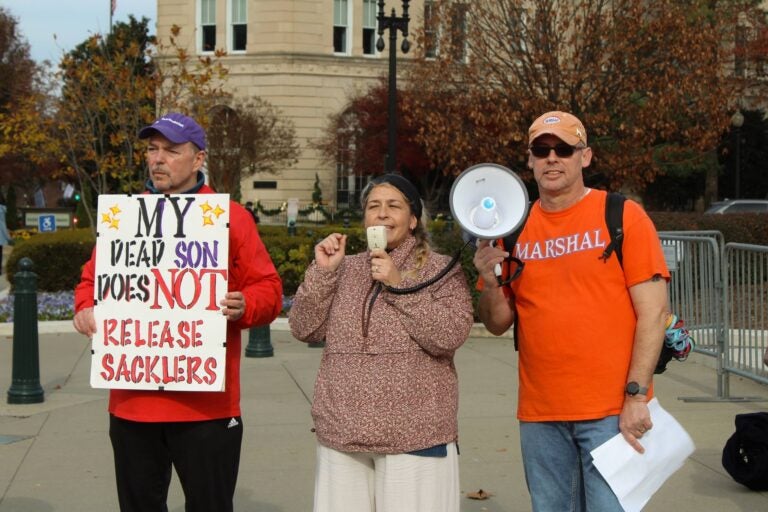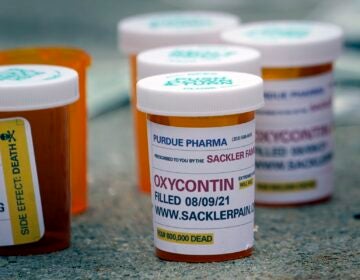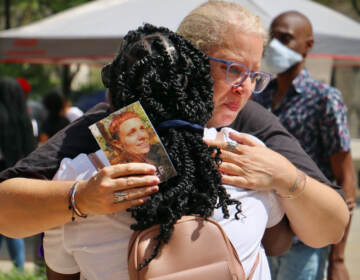Philly-area parents who’ve lost children to opioid overdoses pledge to push forward in Purdue Pharma lawsuits
Families, cities and states wish to hold Purdue Pharma, the maker of Oxycontin, and its owners, the Sackler family, accountable for the opioid crisis.
Listen 1:27
Susan Ousterman, center, of Bensalem, Pa., lost her son Tyler Cordeiro to a drug overdose in 2020. She now works alongside other families and advocates who want to see Oxycontin maker Purdue Pharma and the company’s owners, the Sackler family, held accountable for their role in the opioid epidemic. (Courtesy Susan Ousterman)
From Philly and the Pa. suburbs to South Jersey and Delaware, what would you like WHYY News to cover? Let us know!
The pharmaceutical company Purdue Pharma and its owners, the Sackler family, have become almost synonymous with discussions about the national opioid epidemic and today’s addiction crisis.
At least, that’s true for parents like MaryBeth Cichocki, of Bear, Delaware. She lost her son, Matt, to an opioid overdose in 2015. It happened several years after he was prescribed Purdue’s Oxycontin for a back injury.
“I look back and I think about all the lies that Purdue Pharma told,” Cichocki said of the company’s advertising and marketing tactics to sell mass quantities of pain pills while downplaying the medication’s potential for abuse and addiction.
Cichocki joined other families, cities, states and communities in filing national lawsuits against Purdue Pharma and the Sacklers, accusing the company and its owners of fueling the opioid epidemic.
But after reaching a nationwide $6 billion settlement deal with Purdue and the Sacklers, the case is again in turmoil following the U.S. Supreme Court’s decision last week to reject a lower court’s approved bankruptcy plan and deal because it also included an immunity shield for individual Sackler family members, which would have protected them from future civil lawsuits.
The verdict has left those most affected by opioid addiction with complicated feelings about the ruling and the true price of seeking justice, reparations and accountability for the damage that has been done.
For parents like Cichocki, nothing will ever be enough.
“There is no amount of money that I could ever get from the Sacklers that will fix the damage that they’ve done to me, unless they could reach into the grave and bring my son back,” she said. “We’ve lost so many human beings in our country. How can you put a price on all of that? All of the money, all of the properties that the Sacklers own, it’s not enough. It’s not enough to fix the broken families.”
The death toll in the United States from drug overdoses has eclipsed 100,000 people in the last three years, according to federal data. That included more than 8,700 people in the Delaware Valley tristate area alone in 2022.
Representatives for Purdue Pharma and members of the Sackler family have denied any wrongdoing, but said they regret that Oxycontin became part of the opioid crisis.
Company attorneys told NPR that the recent high court ruling was “heart-crushing” and that they intend to work toward a new deal with plaintiffs in the case.
Others also consider the ruling a setback. Cichocki said while nothing could ever be done to make up for the loss of her son, she thought the settlement money could be put to good use in communities to help people struggling with addiction today.
She is doubtful that members of the Sackler family will ever go to prison, which is what she truly wants.
“I thought it was good that we were going to get money, because I think we could use it for harm reduction,” she said. “We can’t bring our children back, but to honor them, we could have used those funds to fix whatever part of the broken system that we could see fit to do.”
Susan Ousterman, of Bensalem, Pennsylvania, agreed that more resources are needed to support prevention efforts, expand treatment programs and improve the behavioral health system. But said she couldn’t support a settlement deal that shielded the Sacklers from future liability.
Ousterman lost her son, Tyler Cordeiro, to a drug overdose in 2020. He had begun taking opioid medication that was prescribed to a family member.
“You have the Sacklers who ignited this crisis sitting comfortably in their billions while we have countless people in prison who are there simply because of their addiction that started with these pills,” Ousterman said. “The truth is, this is a problem that began with greed, and I just don’t see any way that money is going to solve a problem of greed.”
Instead, Ousterman and other advocates want attorneys to pursue harsher penalties for Purdue and the Sacklers. The Pennsylvania mother said it’s less about justice and more about changing how the public views wealthy corporations and owners involved in the opioid business, thereby changing how society treats people who struggle with addiction.
“If we’re not holding accountable the people that caused it, how could we ever shift that focus?” Ousterman said. “That accountability from the top down, it does vindicate that our children were not moral failures. If they don’t prosecute, it just adds to that narrative like these people [with addiction] weren’t worth it.”
Bucks County Commissioner Gene DiGirolamo said he also sees this as an opportunity to pursue a higher degree of accountability on Purdue and the Sacklers. DiGirolamo’s son is in long-term recovery from opioid and heroin addiction.
“The way they misrepresented the dangers of these opiates, to me, it’s criminal,” he said. “I know people are upset that money is not going to flow in, but it will someday, and maybe it will be even more then.”
For now, the future of an opioid settlement with Purdue and the Sacklers is unclear. The case does not affect other opioid settlement deals with manufacturing and distribution companies that are already paying communities millions of dollars over the next 18 years.
Whatever may happen, Ousterman said she’ll continue to fight in honor of her son Tyler, who was a brother, a drummer, a skateboarder and “just a really good human.”
“If kids were selling lemonade in the neighborhood, he’d run in the house and get all his money and go buy it all. We had strangers that would just knock on the door on Thanksgiving or Christmas Eve. It was people he didn’t want to be alone,” she said. “He just was a kind, pure soul. I really miss him.”
Ousterman is the founder of the Vilomah Foundation, which helps support families and individuals affected by substance use and addiction.
In Delaware, MaryBeth Cichocki also works to help people in her community who’ve lost loved ones to opioids. She founded Support After Addiction Death for grieving families and wrote a book called “Letters to Matt.”
Cichocki is driven to this work in memory of her son, who was “a bright light” and grew up to become a small business owner and lived by the beach.
“We all have this horrific bond that none of us wanted to have and we all understand what it’s like not just to lose a child, but to go through everything, the roller coaster ride, leading up to death,” Cichocki said. “No one could understand it unless you’ve actually lived it.”

Get daily updates from WHYY News!
WHYY is your source for fact-based, in-depth journalism and information. As a nonprofit organization, we rely on financial support from readers like you. Please give today.





